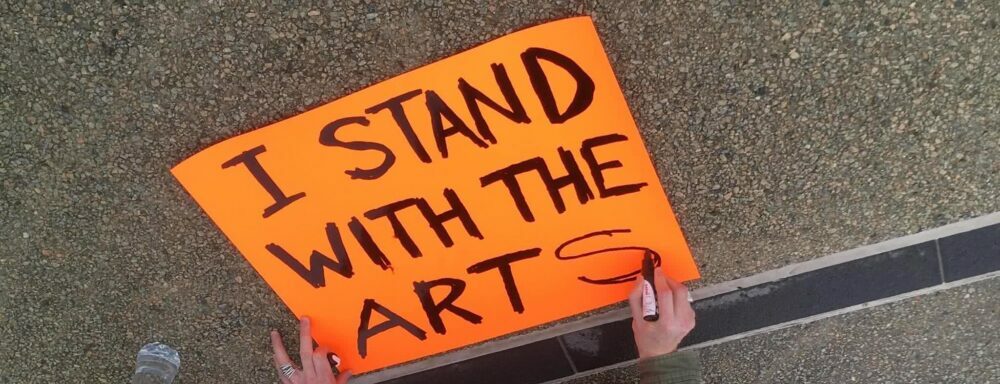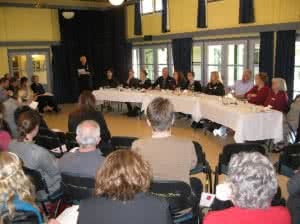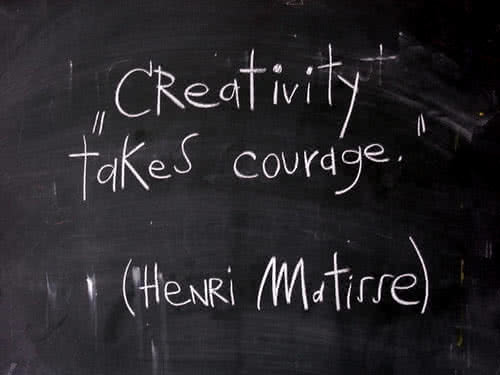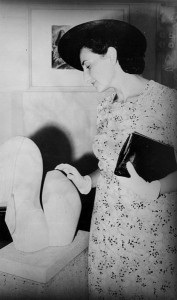
Viennese art critic Dr. Gertrude Langer inspecting a local art show, Brisbane, 1940 (Source: Wikimedia Commons)
If you write a book, or choreograph a dance, or compose a song, or produce a play or film, and no one reviews it, could it be that you never created it in the first place?
In a way that’s what was discussed at this year’s Childers Group forum. Focussing on the Role of the Arts critic, on 18 October 2013 at the Gorman House Arts Centre in Canberra we gathered together a wide range of reviewers, critics, and arts leaders/thinkers as well as a lively and engaged audience to spark a conversation. Who is an arts critic? What exactly is it that they do? How important is their work – does it matter at all? What makes a good review? Does a reviewer have responsibilities? Are there more or less reviews going on these days? And what of the online environment: does this open up opportunities for more review, but, if so, what sort of quality can we expect (or demand)? What’s the nature of the ACT’s culture of review? And, perhaps most importantly, where do we go from here? What are the challenges ahead? If you weren’t able to squeeze yourself inside the Bogong Theatre on the 18th, then you’ve now got a bit of a sense about what was discussed.
Going back to that opening sentence: if there’s one thing that artists struggle with, truly struggle with, it’s the silence, the silence that can meet a piece of work. For months and years, sometimes even decades, an artist slowly but surely brings a work to the world. Most likely there’ll be some kind of celebration – an opening night, a launch, perhaps even just a party on the deck at home. There’ll be champagne and cheese; there’ll be slaps on the shoulder and the odd kiss on the cheek. But the next morning? Well, there’ll be that silence. Sure, over time, people – good people, kind people – will offer up some kind of response. ‘Congrats, it looks wonderful.’ ‘I loved it – you’re amazing.’ ‘Not sure. I kinda wasn’t terribly moved.’ (This last one from the brave but honest and much-needed friend!) Except this isn’t review or criticism; it is response. Artists want response, but they also want more, the greedy devils.
A good piece of creation operates on many levels: there’s the conceptual, the meaningful, the emotionally engaging, and then there’s the sheer entertainment side of things. A good piece of creation sends ripples out into the world. A good piece of creation – sometimes, rarely – changes things. A good piece of creation matters; it can matter more than we can ever possible know. It’s this that a reviewer might explore: they might (should?) situate an artist’s work in a broader context, investigate what the artist (and also theatre, publisher, gallery etc) was trying to achieve, and why this might have any broader resonance, and then come to some kind of conclusion.
Whilst it might help a consumer make a decision, say in the way a restaurant review could, but it is much more. It is not more opinion. It is not simply a recommendation.
As it was said at the forum, a good review ‘illuminates’.
What else was said at the forum? Towards the bottom of this post is the raw data, which is code for ‘the notes we scratched out on a napkin while standing at the back of the crowd’. If you attended, and see weaknesses in these notes, send us an email and we’ll correct/expand them. Also, please have a read of two thoughtful responses from two bloggers who were there: Whispering Gums and Only the Sangfroid (‘If art criticism is going to have a place in the world of tomorrow, it’s going to have to re-imagine itself’); there’s also this piece by Kim Anderson that we published on this site, courtesy of Art Monthly.
But there were two key issues/opportunities raised during the discussion on the 18th, and there’s the challenge – for the community could take them up.
The first is that while the ACT does indeed have a fairly robust culture of criticism, through the traditional print media, other press outlets, and the blogosphere, there is an opportunity for an arts organisation to deliver – perhaps on an annual basis – a master-class in writing arts review and criticism. As was raised at the forum, Realtime, which bills itself as ‘Australia’s critical guide to international contemporary arts’, would be more than happy to come to the ACT to deliver these workshops. All it would take is someone to make a phone-call. Not only would this initiative build skills in reviewing, but would also increase the number of reviewers, and this would be an excellent outcome indeed – for all.
The second issue/opportunity: doesn’t the ACT region, the core of which, Canberra, has been celebrating its centenary, deserve a high-quality ‘journal’ dedicated to review? Wouldn’t that be a brilliant legacy of 2013? Might that be the way that we as a cultural community continue to grow and expand and deepen? Could that be that’s how we become even better artists? Could that be how we become an even better region? The technology is at our finger tips and much of it costs nothing; it is also obvious that we have a community that comprises good critical and creative thinkers, so we’ve got the writers.
We can make this happen. And maybe, just maybe, it would help inform our audiences, help connect with our community, and also – now this would be the greatest outcome of all – help keep that silence at bay.
Here’s that ‘raw data’.
The nature of criticism:
- criticism is a serious and public function
- a critic must have a critical view point, an in-depth contention
- a review should illuminate
- a review should also understand a works creative, cultural, social and political context
- a critic should be disinterested, as in ‘stepped back’ back a little from the work
- the review should be as artful as the work reviewed
- the reviewer should know their audience – is it an arts audience or the general populace
- the criticism is valuable if it’s informed
- it all comes down to the expertise of the reviewer
- a reviewer needs ‘street cred’
- but whose street cred?
- criticism should engage
- criticism should be about knowledge
- criticism is about starting a public discussion
- a review should further dialogue
- a review is about advancing the art form
- sometimes critics have to go straight to the jugular
- but what’s the point in a critic being destructive?
- critics should provide insight
- a critic is a trader of ideas
- a reviewer must be honest, which can be difficult
- how can/should we define ‘qualified opinion’ or ‘quality comment’?
- there’s no such thing as objective criticism
- some critics are terrified/anxious about taking on the significant artists
- a critic who themselves can’t take criticism doesn’t make a good critic!
Criticism and its readers:
- people read reviews to find out what’s happening, to be informed; so a critic is someone who tells you what’s going on
- the public is looking for criticism; they don’t want to the critic to hold back
- in Australia, people don’t take online critics seriously (and artists still yearn for print review)
Criticism in the ACT:
- Canberra is a culturally engaged community, there are many events across parts of society, so there’s limited press space for review
- the city’s still feeling the loss of Muse Magazine
- there are three pillars in the arts: artists, audiences, and interaction (i.e. review, criticism, discussion) – the interaction side of things needs to be strengthened in the ACT, though it’s no different to anywhere else
- issue: Canberra is small, ‘incestuous’ – it’s hard to get artists writing about each other
- the public discussion about public art in the ACT didn’t bring out a nuanced discussion
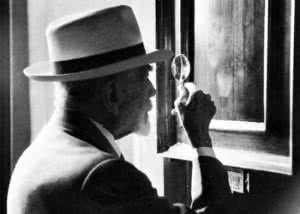
How important is it that we have a culture of robust and thoughtful arts criticism and dialogue? (Image source: Wiki Commons)
Criticism and the artist:
- unfavourable criticism that comes from ignorance is hurtful
- what do artists get out of arts criticism?
- the worse thing is to be not to be reviewed at all
- artists, if they choose, can incorporate criticism into the development of their work/practice
- artists need to be resilient
- but if an artist has a deliberately thick skin they might not be a good artist
- artists are often highly critical of each other
- artists should exercise their own critical faculties
Challenges for the future:
- building expertise in on-line reviewing i.e. making sure online criticism is informed
- see how restaurant reviews work – they’re very popular – and use that model for the arts?
- due to limited payment, not every media outlet can attract the best critic/writer – this is a challenge
- while newspapers are places where debate happens, they don’t have a moral duty to review, including ACT artists or amateur/school productions – so who takes on that role?
- what do we do with critical silence?
- arts organisations have a role to place in building resilience
A significant opportunity:
- for an organisation or a number of organisations to host workshops and forums to build skills in reviewing and being a reviewer
- who’s up to take this on?
*
The panelists at our forum were: Robyn Archer AO (Creative Director, Centenary of Canberra), Kerry-Anne Cousins (visual arts critic), Anni Doyle Wawrzynczak (contemporary arts critic), Roslyn Dundas (CEO, Ausdance National), Marion Halligan AM (author, critic), Cris Kennedy (film critic), Helen Musa (Canberra Critics Circle), Jack Waterford AM (Editor-at-large, Canberra Times), Caroline Stacey (CEO/Artistic Director, The Street Theatre), and Ashley Thomson (Editor, BMA Magazine). The forum was facilitated by Yolande Norris. Thanks and gratitude to you all for your time and being involved so enthusiastically.
*
Thanks also to: Allan Sko at BMA Magazine, Barbie Robinson at ArtSound FM, Helen Musa at City News, Genevieve Jacobs at 666 ABC Canberra, Joseph Falsone and team at the Gorman House Arts Centre, and Karmin Cooper at New Best Friend for graphic design support.
*
Many others helped to make this forum happen. You know who you are.
